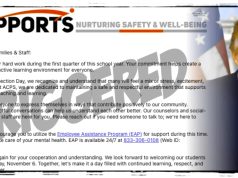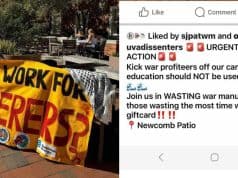by Barbara Fitzgerald
 The removal this week of Ben Hurt’s name from Agnor-Hurt Elementary is indefensible, and so is the process that led the county school board to that decision.
The removal this week of Ben Hurt’s name from Agnor-Hurt Elementary is indefensible, and so is the process that led the county school board to that decision.
This week, with the renaming of Agnor-Hurt Elementary School, the Albemarle County School Board ended its six-year crusade to review the names of every school in the county and rename the ones they found to be offensive. On the board’s website under the heading “Procedure for Renaming a School Facility,” there is this bold statement: “The school board reserves the sole control and authority over the naming of any school and the right to rename a school at anytime, if the name is deemed by the school board to be inconsistent with the current vision, mission, goals and values of the school board.”
Did the board gave itself this broad authority, or did it exist prior to the initiation of the board’s renaming efforts? What about the views of parents and graduates and ordinary citizens? Though the school board website has promised community involvement in the decision-making process through consultation with citizen advisory boards and community surveys, actual implementation of citizenry involvement has been sketchy, manipulated and in at least one case, nonexistent.
Media reports and conversations with involved citizens indicate the advisory boards often were hand-selected by school board representatives ostensibly to reflect diversity but in at least some instances to seemingly reflect the board’s views and expectations. In cases when the advisory board members could not agree or went in a different direction from their school board contact, their opinions could be discredited or ignored. Some advisory board members felt intimidated and pressured to vote in the direction the renaming leaders wanted them to go. Revotes were not uncommon, until the majority eventually agreed to a renaming. (See the online account of how the Meriwether Lewis Elementary name change progressed.)
In the case of Ben Hurt, the Advisory Board had no problem with intimidation or revotes because an Advisory Board was never named, and there was never a vote. The board’s chosen project manager simply appeared before the school board with some speculative and poorly researched accusations about offensive photos in two Albemarle High yearbooks—photos it was assumed Mr. Hurt had approved—and the board voted on the spot to accept that one person’s recommendation to rename Agnor-Hurt Elementary. It was all over back in April before the public knew a decision was made.
But in fact, the case against Ben Hurt violated the stated school board process and policies again and again. Absent an advisory board, it would have been helpful had the school board followed its promise to conduct a survey in the school community to assess public opinion, but that was not done in the case of Agnor-Hurt either. Why was the Hurt case not accorded the basic process courtesies made available to the other school communities whose school names were challenged? Did the school board realize that a community-wide, no-time-limit response against removing Ben Hurt’s name would have been deafening?
Where the school board really fell short was in its investigative research. In nearly every case, the research demonstrates a cursory effort and illogical, unfair and downright false conclusions. In the case of Ben Hurt, for instance, a couple of 82-year-old retired AHS graduates were able to find in a matter of days evidence that disproved all the charges of racism against that legendary AHS principal. Testimony was introduced that proved Mr. Hurt had never seen the yearbooks in question prior to their publication. Also, to show how ridiculous an accusation of racism was, a list of 20 steps taken by Mr. Hurt in the 1960s to ensure a safe and successful integration at Albemarle High easily refuted all charges, as did the testimony of two retired school system employees who had the true story of the “offenses” with which Mr. Hurt was charged.
It wasn’t the first time the “research” efforts misrepresented the facts. The case made against Paul Cale six years ago, based on a supposed direct quote from that esteemed long-time superintendent of schools, was also discredited when it was shown that the supposed quote was only an unsubstantiated paraphrase of Mr. Cale’s words and intent. No one knew what Mr. Cale had actually said, but many people stepped forward to say that supposed quote did not reflect his views. Though the board was presented with the facts in this case, as well as that of Mr. Hurt, well in time for the board to retract their renaming decisions, they held fast, obstinate until the end . So much for facts and research. So much for community input. So much for admitting mistakes. So much for policies.
One more observation on “process”: On July 1 when the official renaming of Agnor-Hurt took place, the board took license once again, violating another of its own dictates. As recorded on the board website, “The Schools [sic] elected to undergo a name change will not retain their original name or the name of another individual as stated in policy of last year.”
Clearly, as Ben Hurt’s name has been removed, then Agnor-Hurt has suffered a name change—has been renamed, if you will. The school is as of this moment Agnor Elementary—except it can’t be Agnor Elementary because a renamed school (see above) cannot possess the name of an individual —that individual in this case being Mr. Agnor. Nevertheless, on Monday of this week, Agnor-Hurt Elementary School officially became Agnor Elementary. “The school board reserves the sole control and authority,” even to violate its own policies. Unfortunately, sole control and authority also means never having to say you’re sorry.








